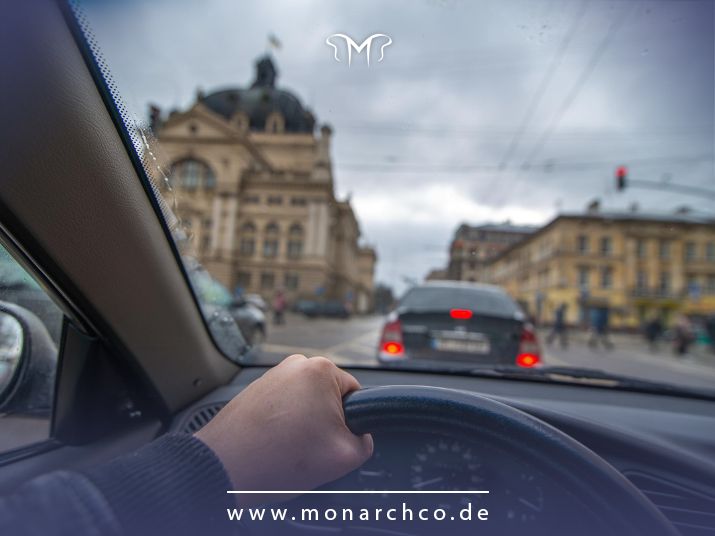
Driving Laws and Regulations in Germany for Immigrants 2024
Traveling and driving in Germany with its extraordinary highways and scenic views is a delightful experience; however, it's important to remember that like many countries, Germany has its own specific driving laws. As the world's first car manufacturer, Germany continuously updates its driving regulations to remain current and prevent violations. Therefore, if you plan to travel to Germany or drive in this country, it's essential to familiarize yourself with the relevant laws and regulations to avoid any problems or fines. In this article, we intend to discuss the driving laws and regulations in Germany for immigrants in 2024. Stay with us.
Is driving in Germany easy?
If you're traveling to Europe and torn between driving your own car and using trains, there are a few things to consider. Fuel prices in Europe are generally lower than in North America; however, the cost of traveling with your own car may be twice as much as using public transportation. Additionally, some cars in this country are diesel-powered, so you need to be careful when choosing a fuel pump.
Driving laws and regulations in Germany are not only straightforward but also driving in this country is considered a very enjoyable experience. If you're accustomed to driving on the right side, you can easily drive in Germany. Even if you're used to driving on the left side, with practice, you can adapt to this situation. Simply practice in less traffic environments first, and then venture onto main roads.
German Driving Culture
When it comes to driving culture, Germany comes to mind as one of the top examples among European countries. The people of this country are known for their orderliness and discipline in everyday matters, and this characteristic is well evident in their driving and traffic behavior. Germany is considered one of the exemplary models in the world in terms of lawfulness and driving culture.
The high level of lawfulness and driving culture seen on the streets and highways of Germany today is the result of precise education, driving laws and regulations in Germany, as well as very heavy penalties imposed by lawmakers in this country. For example, if a German driver fails to yield the right of way to emergency vehicles without regard to their sirens, they may face severe penalties, including up to five years in prison. These strict laws and high driving culture have led to order and safety on the roads of Germany.

Driver's License in Germany
To drive in Germany, you must obtain a driver's license. The German driver's license includes:
• A German driver's license which is valid for driving in all EU member states.
• An International Driver's Permit (IDP) which allows you to drive in most countries worldwide; however, it does not replace the German license.
To obtain a German driver's license, there are specific requirements including:
1. You must be of legal minimum age, eighteen for car driving and sixteen for motorcycle riding.
2. You must have residency in Germany.
3. You must undergo a medical examination to ensure your physical and mental fitness for driving.
4. Afterwards, you must pass both theory and practical exams.
To obtain the license, you need to attend driving school, participate in theory and practical classes, undergo a medical examination, and pass theory and practical exams. After passing the practical exam, you can receive your driver's license.
The driver's license exam in Germany includes questions on technical and mechanical aspects of vehicles as well as traffic laws and regulations in Germany. In addition to the theory exam, practical exercises are also part of the licensing process. These exercises include driving at night, driving on the Autobahn, urban routes, and driving in various conditions, designed to ensure drivers' ability to handle different traffic and road situations.
The cost of obtaining a license varies depending on the place of residence and driving school, but on average it is estimated to be between 1000 to 2000 euros.

Do tourists need a driver's license in Germany?
In Germany, tourists can use their national driver's license under the following conditions:
• Short-term Visits: If you are a tourist or visiting Germany for a short-term stay (typically up to 6 months), you can use your national driver's license for driving in Germany.
• International Driver's Permit (IDP): Depending on your country, you may need to obtain an International Driver's Permit (IDP) along with your national driver's license. The IDP essentially translates your current driver's license.
• EU or EEA Driver's License: If you hold a driver's license issued by a European Union or European Economic Area country, you can use it in Germany as long as it is valid.
• Non-EU or EEA Licenses: For licenses issued outside of the EU or EEA, the need for an IDP may vary. While many non-EU or EEA licenses are accepted for short-term visits without an IDP, having a permit is recommended to prevent any issues, especially if your license is in a language other than German or English.
Do I need an international driver's license for Germany if I am immigrating?
Yes, if you intend to immigrate to Germany and need to know the requirements for an International Driver's Permit (IDP) to drive in Germany, you should consider that the answer to this question depends on various factors including your country of origin and your length of stay.
For long-term residency or if you plan to permanently reside in Germany, you may need to convert your national driver's license to a German driver's license. The process and requirements for this conversion may vary significantly depending on the country that issued your current license. Some countries have mutual agreements with Germany allowing direct exchange of driver's licenses, while others may require you to take written or practical driving exams.
How to obtain an International Driving Permit for Germany
The International Driving Permit (IDP) is essentially a translation of your national driving license into various languages, allowing you to drive in other countries. To obtain an International Driving Permit in Germany, you must apply in the city where you reside. This application must be made in person by you, and no one else can apply or receive the permit on your behalf. To obtain an International Driving Permit in Germany, you must follow these steps:
1. First, you must upload your documents on the relevant website. To complete this form, you must have your national driving license.
2. After reviewing your documents, the International Permit in German will be issued, which you can receive through the same website.
Required documents for obtaining an International Driving Permit
To obtain an International Driving Permit, you must provide the following documents:
- Valid passport or identification document.
- Two passport-sized photos.
- Biometric passport image.
- Your national driving license
Driving Laws in Germany & Road Regulations
When it comes to driving laws and regulations in Germany, you should pay attention to the following points:
• To drive in Germany, you must be at least 18 years old and hold a valid driver's license.
• The use of seat belts is mandatory in Germany.
• Driving on German roads is generally on the right-hand side.
• Order and discipline between lanes on German autobahns are highly important.
• There are speed limits on German highways.
• The speed limit for driving in cities and residential areas is usually 50 kilometers per hour.
• In case of emergencies, you can call 112.
• Emergency vehicles must have flashing lights.
• School buses have priority at bus stops.
• The international three-color traffic light system is used in Germany.
• The use of mobile phones while driving is prohibited unless you use a hands-free device.
• During winter and cold icy days, German drivers are required to use winter tires. If the police find a vehicle with regular tires, the driver will face a €40 fine. If this vehicle causes an accident or obstruction, the fine amount increases to €80.
Which side of the road does Germany drive on?
In Germany, similar to Iran, drivers move to the right and overtake from the left. Most road markings in this country are white. In bicycle paths or Radweg, cyclists may be moving, and drivers must stop at pedestrian crossings when pedestrians are waiting to cross.
Drinking and Driving in Germany
Germans are known for their alcohol consumption. However, there are strict laws for driving under the influence. According to these laws, the maximum permissible alcohol level in any drink while driving must be 0.5 milligrams, and if you exceed this amount while driving, you must pay a €500 fine and your driving license will be suspended for one month.
Seat Belt Safety and Car Seat Laws in Germany
In Germany, wearing a seat belt is mandatory for all vehicle occupants, including those sitting in the back seat. Failure to comply with this law results in heavy fines. Additionally, children under 3 years old must use a special car seat in the car. Children under 12 years old with a height of less than 150 centimeters must also sit completely on the seat.
Speed Limits in Germany
Germany is known for having highways with speed limits and even some roads with no speed limits; however, many sections along German highways have strict speed limits.
For example, based on driving laws and regulations in Germany, the maximum speed limit in urban areas is 50 kilometers per hour (31 miles per hour), and in non-urban areas, it is limited to 100 kilometers per hour (62 miles per hour). The recommended speed for German highways is 120 kilometers per hour, and in some areas, up to 130 kilometers per hour.
Cost of Driving in Germany
Driving expenses in Germany encompass several components, including:
• Fuel costs for gasoline and diesel;
• Vehicle purchase expenses;
• Car rental fees;
• Fines related to driving.
Driving fines in Germany for speeding violations, depending on the residential area or highway, range from 20 to 700 euros. In either case, the offender receives two negative points on their license and a three-month driving ban. We will discuss other driving fines in Germany below.
Gasoline and Diesel Costs in Germany
Gasoline and diesel, the two primary fuels in Germany, are quite expensive. Refueling on weekends may be more expensive than on weekdays. Therefore, it is a good idea to refuel during regular weekdays between 6:00 PM and 8:00 PM.
Vehicle Purchase Costs in Germany
The average cost of purchasing a car depends on the type of vehicle and the company from which it is purchased. Additionally, there are other ancillary costs such as taxes, repairs, car insurance, as well as operational costs such as fuel, etc., which are part of monthly living expenses in Germany and should be considered. Generally, ancillary costs for regular cars are 520 euros per month, and for electric cars, they are 788 euros per month.
Car Rental Costs in Germany
The cost of renting a car in Germany also depends on the type and model of the car you intend to rent and is not a fixed number. Those renting a car must have a valid driver's license and passport.
Types of roads in Germany for driving
German roads are divided into several main categories, including Autobahns, underground and regional roads, urban roads, and federal highways. Types of roads in Germany for driving include:
• Autobahns: Driving on German Autobahns is enjoyable due to their exceptional engineering. Motorcycles, bicycles, and any vehicle moving at less than 60 kilometers per hour are prohibited on these roads.
• Underground and regional roads: These roads are primarily routes outside of cities with less traffic and speed limits are enforced.
• Urban roads: These roads are city streets where driving is done at a speed of 50 kilometers per hour.
• Federal highways: These highways are marked with yellow rectangular signs with black numbers and are approximately 520 kilometers long.

Other things to know when driving in Germany
In addition to the information provided about driving laws and regulations in Germany, the following should also be considered when driving in Germany:
• If your car lights are defective in any way, driving at night is prohibited, and you will be fined.
• All vehicles must have a portable first aid kit and a warning triangle in the rear trunk.
• Parking on the side of the street is only allowed in the direction of traffic, and in one-way streets, parking will be allowed on both the right and left sides.
• Large, bulky vehicles are less common in Germany, and most vehicles are small and compact.
• If your stay in Germany is less than 6 months, you do not need an international driving license, provided that your visa is valid for at least 6 months.
• All vehicles traveling on German streets must have a TÜV approval sticker. Broken lights, faulty exhaust systems, and even minor defects in critical areas can cause vehicles to fail in the relevant tests.
• If a driver deliberately blocks the route for emergency vehicles, they will be held responsible for all ensuing incidents. If someone is injured or loses their life as a result, the driver will be detained on charges of assault or homicide. If there is no bodily harm, the driver will face a fine of 1000 euros.
• In Germany, taking photos or videos of injured individuals involved in an accident by unauthorized persons is subject to legal action and may lead to imprisonment. Unlike some countries where individuals take photos in emergency situations, German citizens are obligated to provide assistance. Failure to assist in emergencies can result in imprisonment.

Conclusion
In this article, we have attempted to explain the driving laws and regulations in Germany in 2024. This country has precise laws that must be followed, but driving in Germany is also enjoyable. Driving in Germany is accompanied by strict rules, but its cars and roads, thanks to their beautiful and luxurious design, provide an enjoyable experience. You need a license to drive in this country, which you can obtain by completing the relevant steps. Additionally, as an immigrant, if you intend to use your foreign driver's license, you must authenticate it, which is valid only for six months in Germany.


